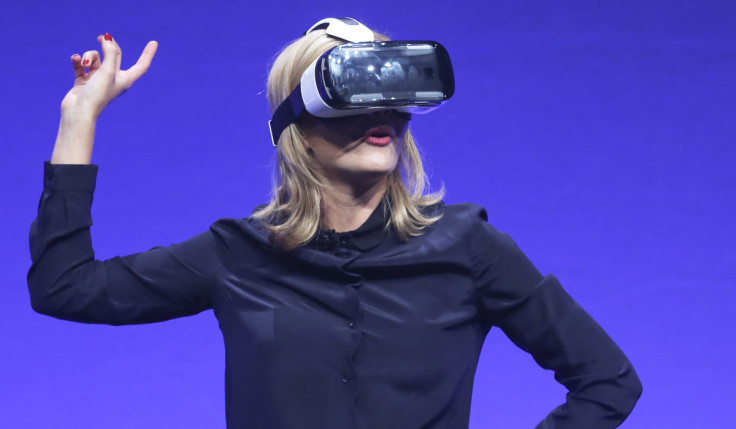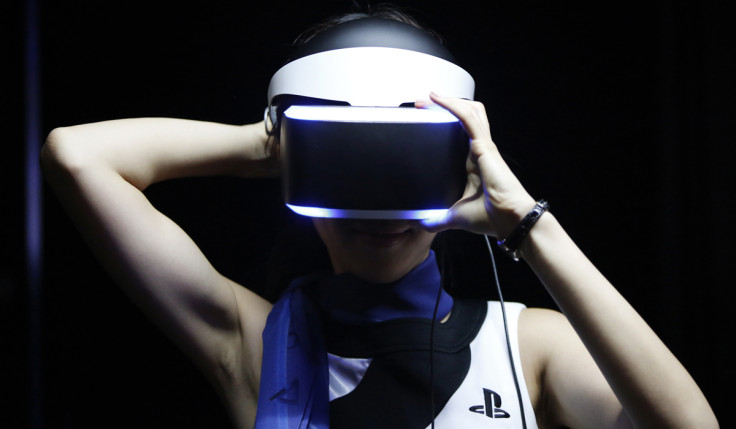Interview: Former Sega CEO Mike Hayes on the Virtual Reality Future

Virtual Reality (VR) hopes to change the world with devices such as Oculus Rift, Sony's PlayStation-based Project Morpheus, and the Samsung Gear VR (made in conjunction with Oculus).
IBTimes UK went hands on with the Samsung Gear VR at a recent event in London and afterwards we sat down with Mike Hayes to discuss the virtual reality revolution, its many uses beyond gaming and the UK video game industry.
Hayes is an English businessman who was president and CEO of Sega Europe and America between 2009 and 2012. He now leads the digital and e-commerce division of Mercia Fund Management, who have invested £1.5m (€1.9m) in UK video game companies.
One of the companies in which they've is nDreams, a development studio working on applications such as Perfect Beach and Gunner for the Samsung headset.
IBTimes UK: Why is virtual reality the future?
Mike Hayes: It's the future in many respects. I think that it is bringing a new dimension into gaming and applications in general, taking them away from 2D into something that is conceptually, and can be physically, motion-orientated. With gaming we've waited a long time for the technology to be there to make virtual reality, a reality.
It's worth saying there are virtual reality applications in all other walks of life that are going to revolutionise. Whether you're talking about health, education, training, defence, emergency services and the way in which we interact socially, virtual reality is going to have a profound effect that will permanently alter the way we do certain things.
The hardware guys behind it all are also big and serious. Facebook with Oculus, Samsung, Sony - those are big hitters who will ensure this is successful.
The VR revolution, with Oculus Rift as its poster boy, seems to have been in the making for a long time. Why is it taking so long to make its way to retail?

It's the level of technology really. To be able to get that level of fidelity, that gives you that sense of reality when you're using the device. What we have now is this combination of this immersive technology that's going to be affordable for people, and a degree of skills in the gaming industry that understands what immersion should be.
There are really all these little bits that have come together to create this perfect storm of VR being able to be delivered, and I think it will become a mass-market piece of entertainment.
VR's natural or assumed home is in the video game industry. In what ways will VR succeed where other methods of interacting with games – like glasses 3D and motion control - have failed?
In that the interface between you and the game experience is a sophisticated piece of kit. The 3D part before was probably a little gimmicky with the device that you needed to make it happen, which were just plastic glasses effectively.
Motion control requires you to do a lot of specifics while still interacting with the same interfaces that you're used to.
But with Oculus and what Sony are showing, you've got something very sophisticated that really takes you into that virtual world so you're not being distracted. Therefore I think the experience is going to be a lot more complete.
You wouldn't be investing so heavily in the UK video game industry if you didn't see a bright future for it. How crucial is VR to that future and how important is it that UK developers are ahead of the curve?
It's absolutely fundamental. I think VR is one of the most important things for the gaming industry since smartphones came into play. We know smartphones created a seismic change in how the industry is run, is developed, publishes and so forth. VR is the next piece in video games' never-ending journey to find how they can use technology to entertain people.
The thing about the British games industry is that they have always been at the forefront of new technologies. We have some of the best games engineers in the world and VR is something I think we can embrace successfully.

It wasn't until Facebook bought Oculus earlier this year that people really started to understand the huge potential for VR beyond the game industry. Is that where VR will have the most impact?
We actually invested in nDreams the day before the Oculus/Facebook deal was announced, so we felt quite smug about that [laughs].
I tend to think that the game industry pioneers. When I started out back in the late 80s, gaming was some freaky thing geeks played and nobody was interested in. Now it is a $65bn global business and something like two thirds of all people in the UK play games of some sort.
Gaming in the next two or three years will set this market up, grow it to this $5bn or $6bn dollar part of the overall gaming market, but then those applications will spin out in less sophisticated but more important ways, that use the tech in new areas.
Can you imagine every school having access to VR for education, so you don't read about the trenches, you're in an experience that gives you some idea of what went on in history? Can you imagine in training for emergency services it can put you in that environment of danger so you can make decisions to help train you for real life?
My sense is that gaming will drive it and that's where a lot of the clever engineering will come, and then in a very short period of time that's going to spin out into so many different areas that together those areas will become far greater than that games piece, but you're still talking about a games market that is huge and significant.

Do you have any concerns about the future of VR, maybe how the tech might evolve or be misused?
With all new technology comes uncertainty. I remember when I first saw the Wii, I thought 'Really? You expect us to stand around and wiggle those things? Are you joking?' and however many gazillions of sales later we've seen how successful that's been. However, that didn't mean we weren't going to get behind Wii from the get-go, we just didn't know how big it was going to become.
It's my view that VR's time has come and it's going to be very big, but will it be the causal end that is bigger – do we spend more there? – or will it be the core games side – do we invest there?
Who's going to win? Morpheus, Oculus? Is the Samsung – a more casual option – going to be there? Will others enter the fray? I have absolutely no idea, but I think as a whole it's going to be big.
There's uncertainty in terms of what, but I don't think there's uncertainty that it is going to happen.
You say others may enter the market. Do you expect Microsoft to be one of them?
I genuinely don't know, because I'm not privy to that information, but I would be surprised if they didn't. And never discount something from Nintendo; maybe they could join the lighter end of the arc.
Nintendo prefer to pioneer rather than follow. In a recent interview Shigeru Muyamoto said he wasn't a fan of VR, and voiced his concerns that it shuts people out from the kind of social, local multiplayer they've been pushing of late. Maybe though, VR will become something they can't ignore.
Or maybe... I know it's not quite similar, but we had Kinect doing motion control but then you had Wii that nailed it. It could be that they take that technology and take it to the next step, make it less techy. But again, I genuinely don't know.
Thanks for your time.
Thank you.
© Copyright IBTimes 2025. All rights reserved.



















